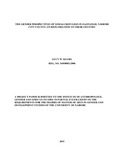| dc.description.abstract | This study was carried out, in Eastleigh, which is a suburb within Kamukunji Constituency, Nairobi City County, Kenya. The study examined the attitudes of the Somali refugees in that area regarding their impending repatriation to Somalia. In particular, the study looked at their security concerns, fears regarding the unity of their families and their access to meaningful livelihoods. Data were collected using semi-structured interviews, focus group discussions and key informant interviews.
The study reveals that all urban Somali refugees have fears, attitudes and concerns regarding their security, unity of their families and their access to meaningful livelihoods due to the planned repatriation to their country. Their main fear is the security situation in Somalia which informs the negative attitude that they have regarding voluntary repatriation. They are clear that despite the various reports of relative stability returning to some parts of Somalia, such information is not conclusive. The refugees feel that the security conditions in their country are still life-threatening and thus the negative attitude towards immediate return. Both men and women fear that repatriation will lead to further disintegration of family units and change in gender roles. They also fear that, they will lose their livelihood opportunities and social amenities they have been enjoying in Kenya as well as the opportunities for quality healthcare services, education, access to shops and other trading facilities.
This study, therefore, recommends that the Federal Government of Somalia should seek more funding and technical assistance to enhance the activities of the AMISOM troops in the country. It should also initiate the process of improving infrastructure and social amenities; set up modern healthcare facilities, schools and market centres as well as improve the transport and
communication network. On its part, the government of Kenya should continue to honour its international obligations in accordance with the tripartite agreement as well as encourage refugees to make informed choices to repatriate voluntarily. It should refrain from refoulement of refugees to Somalia. The study also recommends that similar studies be done for camp-based refugees, as well as studies related to gender issues of refugees undergoing local integration in their countries of asylum and resettlement in third countries. | en_US |

